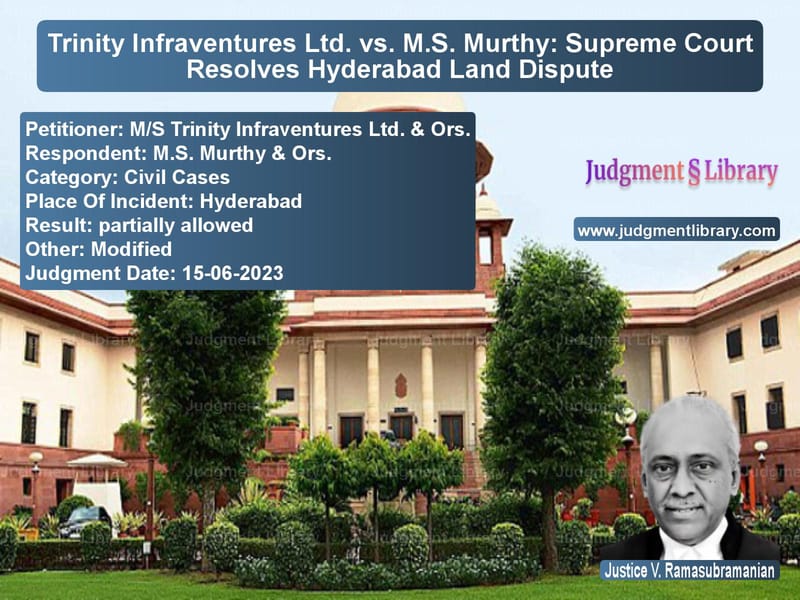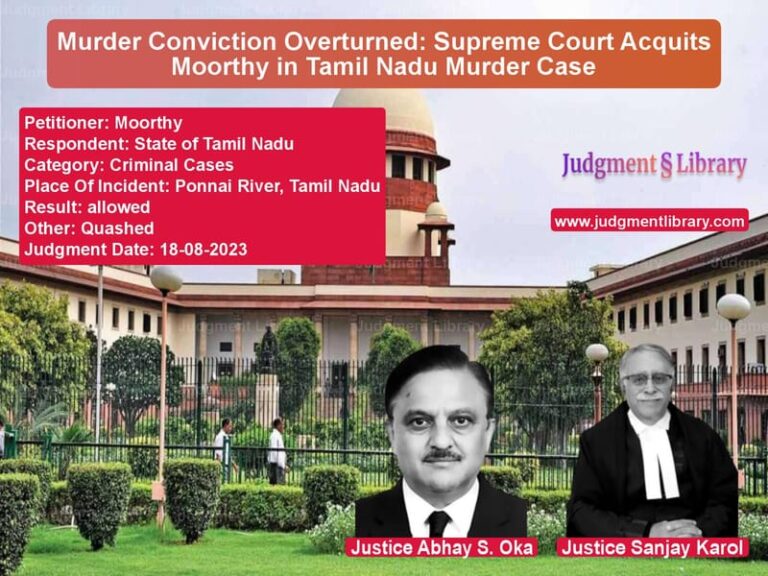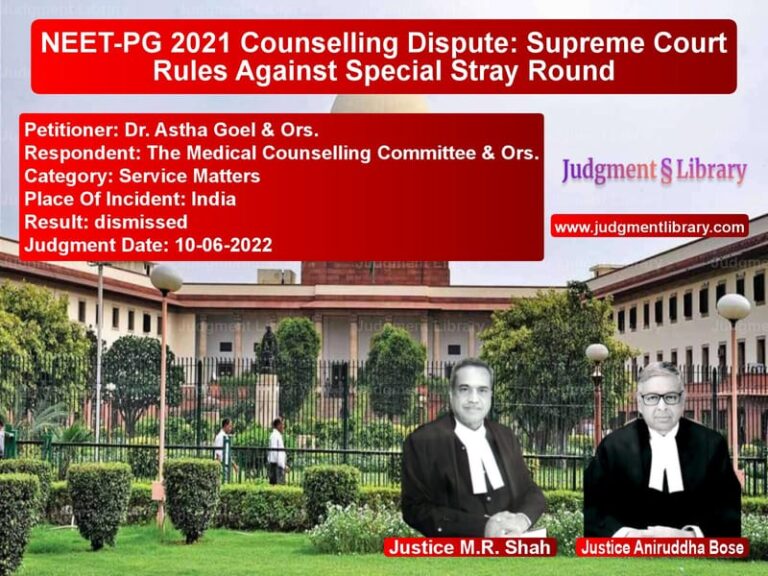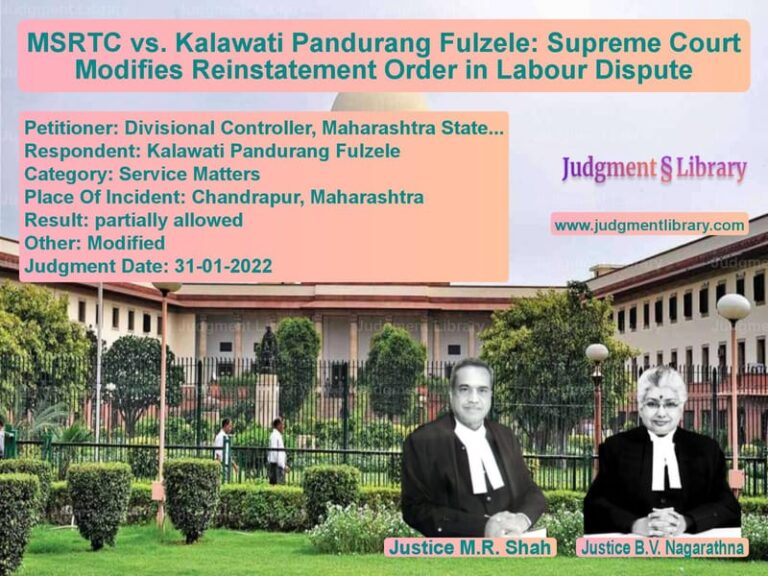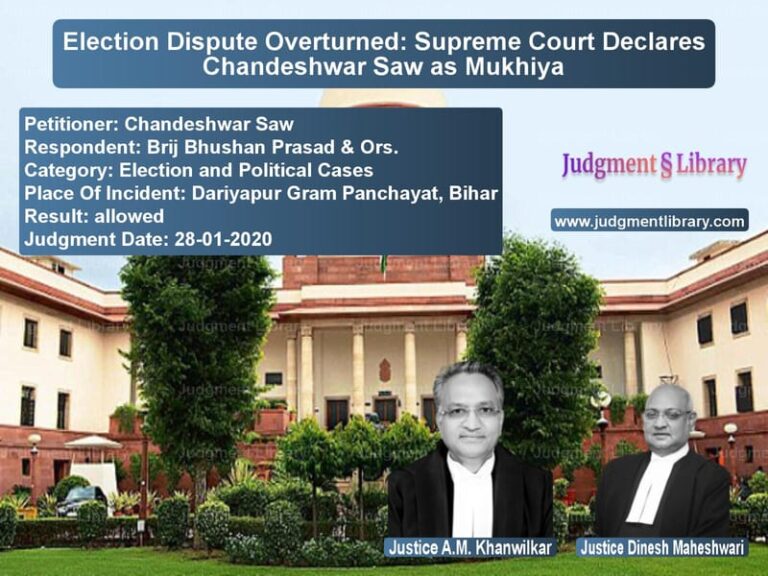Trinity Infraventures Ltd. vs. M.S. Murthy: Supreme Court Resolves Hyderabad Land Dispute
The case of M/S Trinity Infraventures Ltd. & Ors. vs. M.S. Murthy & Ors. is a significant legal battle concerning the ownership and execution of decrees related to historic land grants in Hyderabad. The Supreme Court’s decision, delivered on June 15, 2023, has far-reaching implications for land ownership claims, enforcement of judicial decrees, and the interpretation of historic legal rights.
The dispute primarily involved properties in the erstwhile Paigah Estates, which date back to the rule of the Nizam of Hyderabad. The case stemmed from a civil suit (CS No. 14 of 1958) that sought the division and distribution of properties inherited from the Khurshid Jah Paigah. Several parties, including private individuals, cooperative societies, and even the State of Telangana, laid competing claims over different parcels of the land.
Background of the Case
The land in dispute was part of the historic Khurshid Jah Paigah, an estate granted for maintaining armed forces under the Nizam’s rule. With the abolition of the jagirdari system and subsequent land reforms, disputes arose over whether these properties were Mathruka (inheritable) properties or had vested in the state.
Over the years, numerous transactions occurred, including assignments of decrees, sales to private entities, and alleged encroachments. Various parties obtained preliminary and final decrees in court, and efforts were made to enforce them through execution petitions. However, several challenges emerged, particularly from occupants who resisted eviction, claiming independent title or adverse possession.
Key Issues Before the Supreme Court
- Whether the preliminary decree passed in CS No. 14 of 1958 was vitiated by fraud.
- Whether the claim petitioners had a valid independent title to the land.
- The scope of an executing court’s jurisdiction under Order XXI Rules 97 to 101 of CPC.
- The impact of past judicial findings, including decisions of the Nazim Atiyat Court and the issuance of Muntakhabs (title documents) by government authorities.
- Whether the State of Telangana had legitimate claims over the land under various land reform laws.
Supreme Court’s Decision
On Fraudulent Decree Execution
The Supreme Court found that the preliminary decree in CS No. 14 of 1958 was misused to execute property transfers in a manner that was not legally permissible. The court held:
“The manner in which a simple suit for partition was converted into a title suit and led to multiple final decrees based on compromises, was a gross abuse of the process of law.”
It noted that assignments of decrees, sales of undivided shares, and court orders obtained without the participation of all stakeholders tainted the process.
On the Rights of Claim Petitioners
The claim petitioners, primarily residents and cooperative societies, argued that they had received pattas (land grants) before 1948 and had been in possession of the land for decades. The Supreme Court upheld the findings of the High Court that the claimants had established legitimate rights over their occupied lands.
Read also: https://judgmentlibrary.com/supreme-court-rejects-wakf-claim-over-disputed-land-in-tamil-nadu/
The court ruled:
“The claim petitioners have been in possession of the land in dispute for a prolonged period, and their title was recognized through valid documents, including government records.”
On the State of Telangana’s Claim
The State of Telangana had claimed that the disputed lands had vested in the government following the abolition of jagirs and other land reforms. However, the Supreme Court clarified that:
“While certain lands may have vested in the government, pattas granted prior to 1948 and recognized by subsequent government actions cannot be ignored.”
Thus, the state’s blanket claim was rejected, though the court allowed room for specific legal proceedings to determine the status of non-claimed portions of the land.
Final Ruling
- The preliminary decree in CS No. 14 of 1958 was deemed unenforceable against third parties.
- The claim petitioners were recognized as legitimate title holders for their respective portions.
- The executing court was directed to take steps to ensure that landowners retain possession of their properties.
- The State of Telangana’s claim over the entire land was rejected, though it could pursue title claims in independent proceedings.
Implications of the Judgment
This ruling sets a landmark precedent for the enforcement of decrees in partition suits. The Supreme Court’s decision establishes that:
- Preliminary decrees in partition suits cannot be misused to establish title over properties in possession of third parties.
- Fraudulent execution proceedings will not be allowed to dispossess rightful occupants.
- The rights of occupants with long-standing possession must be protected under land reform laws.
Conclusion
The Supreme Court’s judgment in Trinity Infraventures Ltd. vs. M.S. Murthy is a crucial verdict that reinforces the integrity of legal proceedings in land disputes. It ensures that historical land claims are examined with due diligence and prevents misuse of judicial processes to unfairly deprive rightful occupants of their property.
Petitioner Name: M/S Trinity Infraventures Ltd. & Ors..Respondent Name: M.S. Murthy & Ors..Judgment By: Justice V. Ramasubramanian.Place Of Incident: Hyderabad.Judgment Date: 15-06-2023.
Don’t miss out on the full details! Download the complete judgment in PDF format below and gain valuable insights instantly!
Download Judgment: ms-trinity-infraven-vs-m.s.-murthy-&-ors.-supreme-court-of-india-judgment-dated-15-06-2023.pdf
Directly Download Judgment: Directly download this Judgment
See all petitions in Property Disputes
See all petitions in Landlord-Tenant Disputes
See all petitions in Specific Performance
See all petitions in Damages and Compensation
See all petitions in Judgment by V. Ramasubramanian
See all petitions in partially allowed
See all petitions in Modified
See all petitions in supreme court of India judgments June 2023
See all petitions in 2023 judgments
See all posts in Civil Cases Category
See all allowed petitions in Civil Cases Category
See all Dismissed petitions in Civil Cases Category
See all partially allowed petitions in Civil Cases Category

